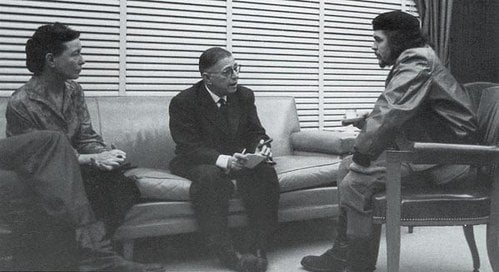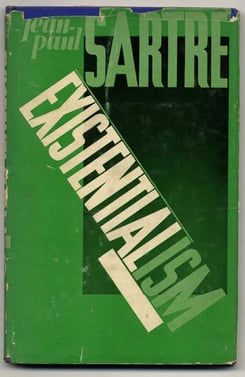Jean-Paul Sartre lived a full life. He is widely remembered for his contributions as a philosopher, playwright, and teacher. His notable works include his philosophical magnum opus, L'Etre et le néant [Being and Nothingness] which was published in 1943, and his plays, Les Mouches [The Flies], 1943 and Huis Clos [No Exit], 1947. His ideas have a continued influence on philosophical and literary studies today. But what are some other facts about the esteemed thinker? Read on to discover five interesting factoids about Jean-Paul Sartre.
 1. He was awarded the Nobel Prize in Literature, but turned it down.
1. He was awarded the Nobel Prize in Literature, but turned it down.
Sartre was awarded the Nobel Prize in Literature in 1964 "for his work which, rich in ideas and filled with the spirit of freedom and the quest for truth, has exerted a far-reaching influence on our age". He declined the award for several reasons which he outlined in the October 26, 1964 edition of Le Figaro, a French daily newspaper.
First, he cited that he always refused official honors, and indeed, he had also turned down membership to the Legion of Honour at this point. He claimed he would similarly turn down the Lenin Prize if offered it. He refused to associate himself and his work with an institution, arguing it went against what he stood for as a writer. He also wanted to see the Nobel Prize distributed to individuals of all ideologies and nations—East and West—and until it was, believed his acceptance would be misconstrued.
2. He once got a schoolmaster fired.
While attending school at Ecole Normale Supérieure, Sartre targeted his schoolmaster, Gustave Lanson with a series of pranks which culminated in the termination of Lanson’s contract with the school. Sartre began simply enough by impersonating Lanson and pulling certain tricks. But eventually, he and his fellow philosophy students—called “Normaliens”—pulled a doozy of a prank.
After convincing the media that Charles Lindbergh would be making a stop at Ecole Normale Supérieure on his European tour following his transatlantic flight, Sartre and his classmates rigged up a look-alike for the aviator who scurried into a building with the media close at hand. People all around Paris were talking about the incident, and Lanson was forced to resign for his lack of control over his students.
3. He was a WWII POW.
Sartre got drafted in 1939 and served as a meteorologist in the French military during World War II. He was captured a year later by German forces and lived for nine months in Nazi-inhabited Nancy, France as well as Stalag XII-D.
While being held captive, Sartre was able to write his first play, Barionà, fils du tonnerre. Some scholars also note that it was during his time as a POW that Sartre read German philosopher Martin Heidegger's Being and Time. That work had a huge influence on Sartre’s Being and Nothingness. After being released due to poor health in 1941, Sartre wrote and published Being and Nothingness in 1943.
4. 50,000 people showed up for his funeral procession.
 For physical proof of Sartre’s impact, look no further than his funeral procession. Sartre passed away on April 15, 1980. His funeral was held the following Saturday, April 19. 50,000 Parisians lined the streets for his funeral procession through town.
For physical proof of Sartre’s impact, look no further than his funeral procession. Sartre passed away on April 15, 1980. His funeral was held the following Saturday, April 19. 50,000 Parisians lined the streets for his funeral procession through town.
In a May 18, 2000 article for The Nation, Daniel Singer posits that such a demonstration of support for Sartre was the:
“last demo of the New Left. It was posthumous in another sense. The engagement associated with Sartre–the intellectual’s or writer’s social and political commitment–had been cast aside five years earlier by the self-appointed “new philosophers”–crude in thought but skilled in propaganda–who loudly proclaimed that any attempt to alter society radically was bound to end with the gulag.”
But, Singer argues, Sartre’s funeral procession is indicative of Sartre’s numerous supporters, those who would rather have been “wrong with Sartre than to be right with [Raymond ]Aron”, Sartre’s contemporary philosopher.
5. He owned and popularized being an existentialist.
Many names come to mind when discussing existentialism. 19th century thinkers Søren Kierkegaard and Friedrich Nietzsche, for example, both contributed significantly to what became the existential movement. Existentialism as we know it wasn’t defined until the mid-20th century, and Sartre did his part to popularize the movement. His short book, L'existentialisme est un humanisme (Existentialism is a Humanism), based on a lecture he gave in 1940, was a catalyst for the acceptance of existential thought.
Unlike some of his contemporaries, Sartre owned the title of existentialist. According to Robert C. Solomon in his book From Rationalism to Existentialism: The Existentialists and Their Nineteenth Century Backgrounds, Albert Camus—whose name is often spoken in the same breath as Sartre’s—did not think of himself as an existentialist but rather an absurdist.
Sources: Nobelprize.org, Tameri.com, The Nation









